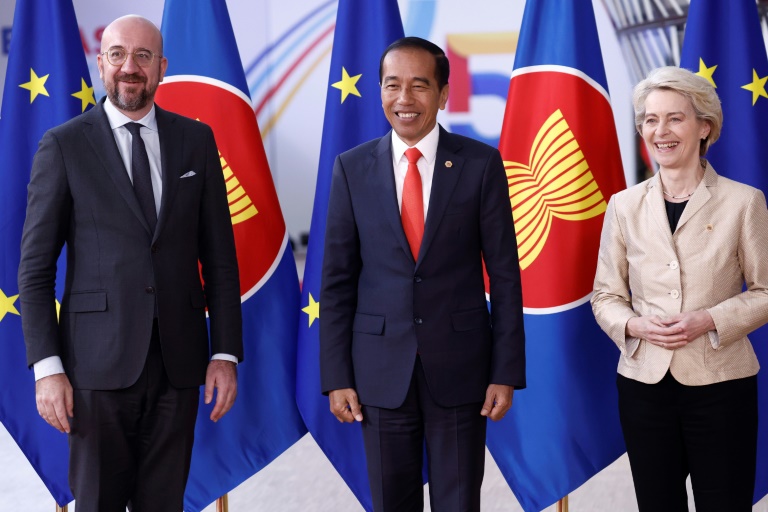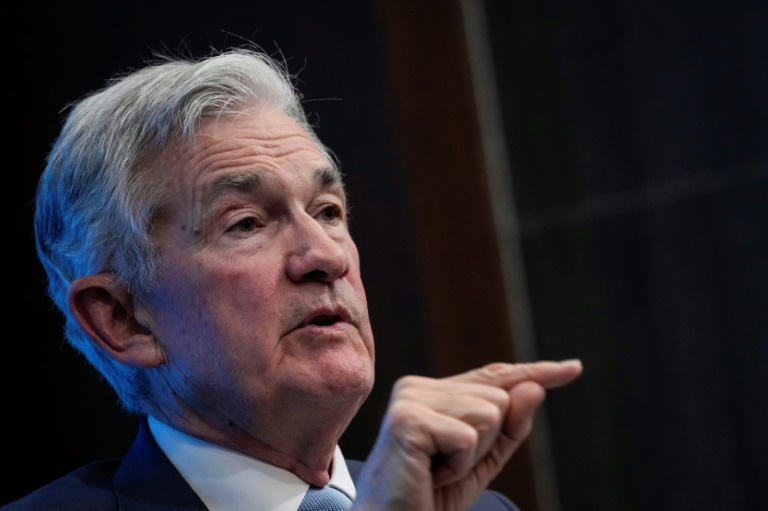Equities sink as central banks hike rates further
Global stocks sank Thursday as central banks hiked interest rates again and signalled they needed to go higher to fight inflation.
Both the Bank of England and the European Central Bank mirrored the Fed’s half-point hike on Wednesday to tackle soaring inflation, after rate increases in Norway and Switzerland.
Sentiment was hammered after the Fed suggested that it saw US rates topping out next year at 5.1 percent, higher than markets had predicted.
Meanwhile the BoE, which lifted its key rate to the highest level in 14 years, warned that labour market tightness and inflationary pressures justified “a further forceful monetary policy response”.
The ECB delivered a similar message.
“Inflation remains far too high and is projected to stay above the target for too long,” it said.
ECB president Christine Lagarde warned “we should expect to raise interest rates at a 50 basis-point pace for a period of time”.
Market analyst Patrick O’Hare at Briefing.com said “these policy moves were expected, but that still hasn’t helped matters given the understanding that higher rates will inevitably weigh on economic activity.”
Wall Street opened with deeper losses than it posted on Wednesday following the Fed’s hikes. The Dow dropped 1.0 percent at the start of trading.
The S&P 500 fell 1.2 and tech-heavy Nasdaq Composite 1.4 percent.
– Fresh recession fears –
In Europe, London shed 0.6 percent, while Frankfurt and Paris tumbled 2.4 percent.
The Fed also warned that the world’s biggest economy would grow less than expected next year, fuelling fresh recession fears.
Data released Thursday showing retail sales sliding by 0.6 percent in November from October, as well a drop in industrial output, fanned those fears.
The BoE and ECB also had downbeat messages about growth.
Rising rates fan recession concerns because they push up loan repayments for consumers and companies, denting expenditure, investment and economic activity.
At the same time, however, the world’s major central banks are seeking to dampen red-hot inflation, which has been fuelled partly by fallout from Russia’s invasion of Ukraine.
Recent official data painted a picture of slowing inflation in Britain and the United States, although consumer prices remain elevated.
“The interest rate hikes keep on coming and this trend is almost certainly going to remain intact in early 2023,” noted AJ Bell investment director Russ Mould.
“Raising rates makes it more expensive for consumers and businesses to borrow money and theoretically causes a reduction in spending and investment which should help to ease the economy and bring down prices.
“This takes time to work its way through the system and so central banks will continue their rate hiking path until there is adequate evidence to support a shift in policy.”
Markets had rallied earlier this week after data showed the US consumer price index rose less than forecast in November, marking a fifth straight slowdown and the lowest level since December last year.
But the Fed appeared less inclined to accept that the recent figures were enough to indicate enough progress was being made.
“Fifty basis points is still a historically large increase, and we still have some ways to go,” Fed boss Jerome Powell told reporters after the announcement.
Oil prices slid on fears recession would dent crude demand.
– Key figures around 1430 GMT –
London – FTSE 100: DOWN 0.6 percent at 7,451.03 points
Frankfurt – DAX: DOWN 2.4 percent at 14,112.11
Paris – CAC 40: DOWN 2.4 percent at 6,566.64
EURO STOXX 50: DOWN 2.6 percent at 3,872.25
New York – Dow: DOWN 1.0 percent at 33,624.24
Tokyo – Nikkei 225: DOWN 0.4 percent at 28,051.70 (close)
Hong Kong – Hang Seng Index: DOWN 1.6 percent at 19,368.59 (close)
Shanghai – Composite: DOWN 0.3 percent at 3,168.65 (close)
Euro/dollar: UP at $1.0707 from $1.0684 on Wednesday
Dollar/yen: UP at 136.51 yen from 135.45 yen
Pound/dollar: DOWN at $1.2321 from $1.2424
Euro/pound: UP at 86.91 pence from 85.96 pence
Brent North Sea crude: DOWN 0.5 percent at $82.25 per barrel
West Texas Intermediate: DOWN 0.6 percent at $76.79 per barrel
burs-rl/jj






